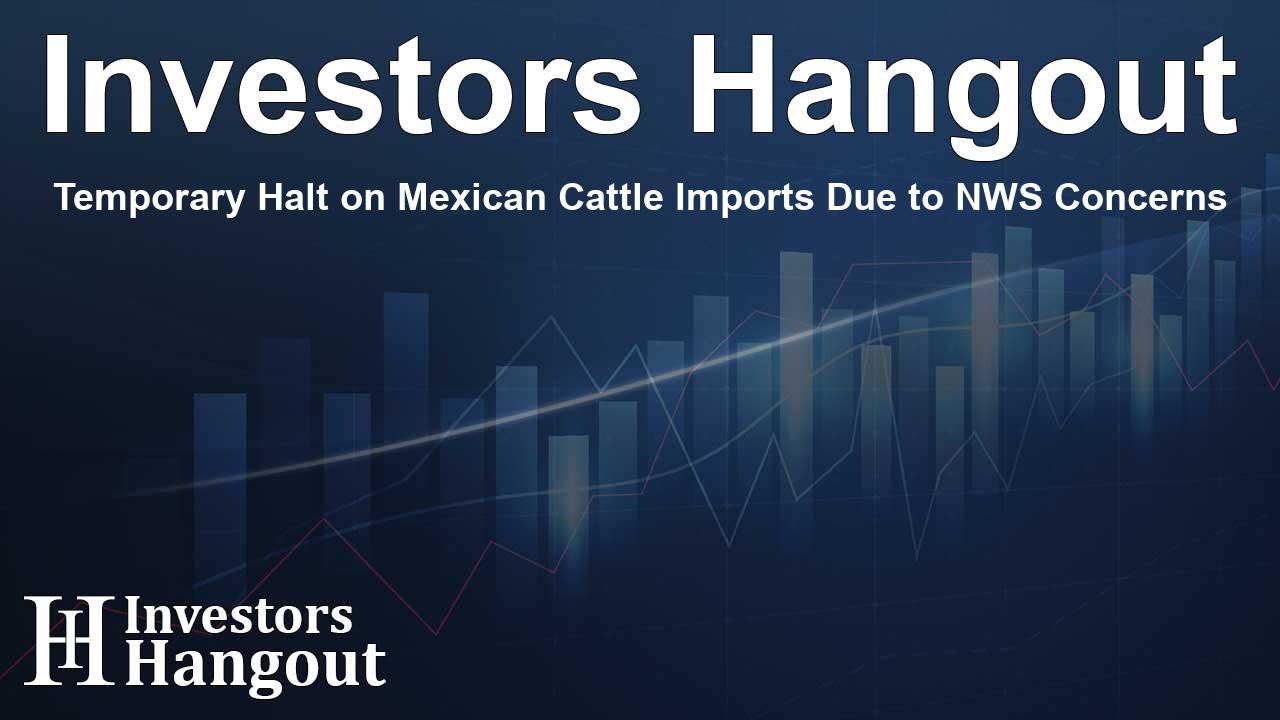Temporary Halt on Mexican Cattle Imports Due to NWS Concerns

US Pauses Imports of Mexican Cattle Amid Screwworm Threat
The recent decision by the United States to stop imports of Mexican cattle has drawn attention to the New World screwworm (NWS) situation. This pause follows the identification of NWS in a cow located near Catazaja in southern Chiapas, as reported by Mexican officials.
Authorities Collaborate to Address the Issue
In response to this alarming discovery, both the U.S. and Mexican governments are working closely to implement measures that will restore the normal flow of exports. Ensuring the health of livestock and preventing any further spread of the NWS is a priority.
Impact on Exports
The statement issued clarified that the halt on cattle imports does not affect other types of exports or goods traveling between the two neighboring countries. Control measures are actively being established to manage the situation and minimize disruption in trade.
Understanding New World Screwworm
The U.S. Department of Agriculture (USDA) informed the public that the chief veterinary officer from Mexico alerted them to this health risk. Infestations usually arise when NWS maggots enter through an open wound, consuming the living tissue of their host. This poses a significant risk not only to livestock but potentially to other warm-blooded animals.
Recognizing the Symptoms
The USDA has noted that the initial signs of NWS infestations can be subtle. Owners should be vigilant and watch for symptoms such as increasing wounds, presence of creamy larvae, and any sign of discomfort in animals.
Preventive Measures and Recommendations
Collaboration with partners within Mexico and Central America is critical in tackling the screwworm's spread. The USDA has urged livestock producers in affected areas to monitor the health of their animals closely. Immediate reporting of any unusual cases is essential to control this outbreak.
The Importance of Vigilance
As livestock owners, it is crucial to maintain awareness of the health conditions affecting their animals. The effects of NWS can be devastating if not addressed promptly, leading to severe consequences not only for the animals but for the economy reliant on healthy cattle exports.
By staying informed and proactive about monitoring and reporting potential signs of NWS, communities can work together to safeguard their livestock and ensure the smooth continuation of trade with neighboring countries.
Frequently Asked Questions
What led to the suspension of Mexican cattle imports?
The suspension was initiated after the detection of New World screwworm in a cow in southern Mexico, raising concerns about animal health.
What is New World screwworm?
New World screwworm is a type of maggot that infests warm-blooded animals and can cause serious health issues by feeding on living flesh.
How is the US government responding to this situation?
The USDA is collaborating with Mexican authorities to implement measures aimed at preventing the spread of NWS.
Are other exports affected by the cattle import suspension?
No, the control measures primarily target cattle imports and do not apply to other types of exports.
What should livestock producers do in light of this outbreak?
Producers are encouraged to closely monitor their livestock for symptoms of NWS and report any potential cases immediately.
About Investors Hangout
Investors Hangout is a leading online stock forum for financial discussion and learning, offering a wide range of free tools and resources. It draws in traders of all levels, who exchange market knowledge, investigate trading tactics, and keep an eye on industry developments in real time. Featuring financial articles, stock message boards, quotes, charts, company profiles, and live news updates. Through cooperative learning and a wealth of informational resources, it helps users from novices creating their first portfolios to experts honing their techniques. Join Investors Hangout today: https://investorshangout.com/
Disclaimer: The content of this article is solely for general informational purposes only; it does not represent legal, financial, or investment advice. Investors Hangout does not offer financial advice; the author is not a licensed financial advisor. Consult a qualified advisor before making any financial or investment decisions based on this article. The author's interpretation of publicly available data shapes the opinions presented here; as a result, they should not be taken as advice to purchase, sell, or hold any securities mentioned or any other investments. The author does not guarantee the accuracy, completeness, or timeliness of any material, providing it "as is." Information and market conditions may change; past performance is not indicative of future outcomes. If any of the material offered here is inaccurate, please contact us for corrections.